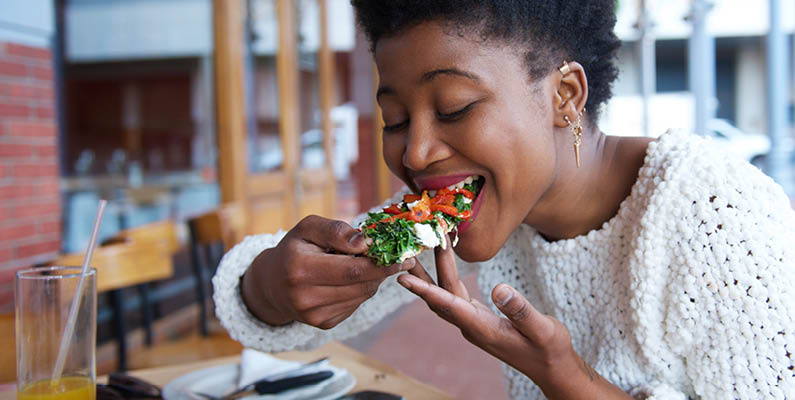 7/27/2021
7/27/2021 Some research shows eating a vegetarian diet can help prevent cancer, lower cholesterol, reduce weight and decrease the risk of high blood pressure and heart disease. These diets frequently contain less fat and fewer calories, along with more fiber and nutrients like potassium and vitamin C. In spite of those advantages, there can be potential risks to your oral health.
There are different types of vegetarian diets:
- Pescatarians eat eggs, dairy products, fish and seafood but no meat or poultry.
- Vegetarians consume eggs and dairy products but no meat, poultry, fish or seafood.
- Vegans avoid all animal products, including eggs and dairy products.
Potential oral health issues
Vegetarian diets generally rely on fruits, vegetables, grains, seeds, nuts and other plants for food. While many of these foods can be good for your teeth, research suggests that a vegetarian diet may be associated with a greater risk of erosion of your teeth’s enamel. This is potentially due to a higher consumption of acidic citrus products.
Possible nutrient deficiencies
Numerous vitamins and minerals help keep teeth and gums healthy. It is possible for people who eat a vegetarian diet to get the nutrients needed to help avoid oral health issues. To do so, it’s necessary to eat a wide variety of foods. It’s especially important to get enough calcium, vitamin D and protein, which can be lacking in vegetarian diets.
Calcium
Calcium is vital in building and maintaining strong teeth and bones. While milk and other dairy products are a great source of calcium, people who avoid dairy can still get sufficient calcium if they consume plenty of:
- Dark green vegetables like kale, broccoli, turnip greens and collard greens
- Calcium-fortified products such as tofu and nondairy milk
- Chickpeas and kidney, navy and white beans
Vitamin D
Vitamin D is needed to help the body absorb calcium. A vitamin D deficiency could lead to tooth decay and gum disease. Few foods are naturally high in vitamin D, and many of them, such as fatty fish and beef liver, are not part of a strictly vegetarian diet. Other products rich in vitamin D, such as egg yolks and fortified cow’s milk, are avoided by vegans. But vegetarians and vegans can get adequate vitamin D through:
- Vitamin D fortified products, including soy milk and low-sugar cereals and juices
- Exposure to sunlight (don’t forget your sunscreen and SPF 30+ lip balm!)
- Mushrooms that have been exposed to sunlight or an ultraviolet lamp (check the nutrition label for vitamin D content)
- Vitamin D supplements (be sure to consult with your physician first)
Protein
Protein-rich foods are necessary to maintain good dental health. They provide the best source of phosphorus, which works with calcium to maintain strong teeth and bones. If you don’t eat animal protein, you will need to eat even more protein than people who do consume animal products. That’s because plant-based protein is harder for your body to digest. Vegetarians should eat a variety of plant-based protein sources throughout the day, including:
If you are a pescatarian or vegetarian, eggs and dairy products can provide additional sources of protein.
It’s also important not to assume all vegetarian foods are healthy. For instance, some chips and cookies can be labeled vegan but contain high amounts of sugars or starches that can lead to plaque and cavities. After consuming carbs and sugars, you should always wash your mouth with water. And continue to protect your teeth by brushing twice a day with a fluoride toothpaste and flossing daily.
If you eat a vegetarian diet or are thinking about trying one, talk to your physician, dentist and dietician or nutritionist. They can help you make sure you’re getting the proper nutrients for great oral and overall health.